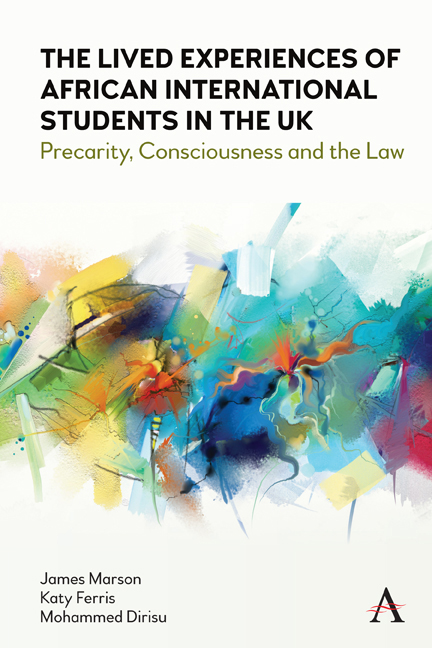 The Lived Experiences of African International Students in the UK
The Lived Experiences of African International Students in the UK Book contents
- Frontmatter
- Contents
- Preface
- Acknowledgements
- Legislation
- Case Law
- 1 Introduction
- 2 Methodology
- 3 Student Migration and Global Inequality
- 4 Migration as a Socio-Legal Phenomenon
- 5 The ‘Student-Migrant-Worker’ Meets ‘Precarity’
- 6 The ‘Utterly Transactional Worker’
- 7 Semi-Legal Working?
- 8 Conclusions
- Bibliography
- Index
5 - The ‘Student-Migrant-Worker’ Meets ‘Precarity’
Published online by Cambridge University Press: 13 September 2022
- Frontmatter
- Contents
- Preface
- Acknowledgements
- Legislation
- Case Law
- 1 Introduction
- 2 Methodology
- 3 Student Migration and Global Inequality
- 4 Migration as a Socio-Legal Phenomenon
- 5 The ‘Student-Migrant-Worker’ Meets ‘Precarity’
- 6 The ‘Utterly Transactional Worker’
- 7 Semi-Legal Working?
- 8 Conclusions
- Bibliography
- Index
Summary
Introduction
In this chapter we begin by exploring the literature surrounding the employment experiences of student-migrant-workers in respect of migrant labour, their position within the broader labour market and how this interaction potentially engenders notions of insecurity for the individual. This approach provides the context on which the empirical evidence presented in this study is assessed. First, we situate student-migrant-workers within the broader literature surrounding migrant labour, noting the distinctions that set them apart from other cadres of migrant-workers. This segues to a discussion of the analytical framework of precarity, highlighting its relevance to the study population. We contextualise this conversation through a discussion of atypical forms of work that fall under the auspices of ‘precarious’ employment. The focus then progresses to one example of atypical employment relationships, TAW, illustrating its allure to the student-migrant-worker population and its detrimental features that are present in precarious employment. The socioeconomic profile and legal indeterminacies surrounding the employment status of workers engaged in this work form are also considered. We close the chapter with an explanation of how the empirical objectives on which this book is based are informed by the relative dearth of literature surrounding the student-migrant-worker population with regard to the analytical frame of precarity.
Unravelling the Employment Experiences of Student-Migrants
In the UK, much of the existing scholarship on migrant work has focused not on international students, but rather individuals engaged in various forms of atypical forms of employment (including both national workers and nonnationals) and their lived experiences, the lived experiences of irregular migrants, and migrants from the European Union (EU) and their experiences before and after the UK's withdrawal from the EU. A limited number of studies have considered the position of international students as migrantworkers. First, the student-migrant-worker population and their labour market participation has been explored from the perspective of sending countries (e.g. Gribble 2008). In respect of specific jurisdictional studies, in an Australian context, Robertson (2011) has assessed the notion of international students and the social and political consequences of the education-migration nexus in Australia.
- Type
- Chapter
- Information
- The Lived Experiences of African International Students in the UKPrecarity, Consciousness and the Law, pp. 95 - 122Publisher: Anthem PressPrint publication year: 2022


